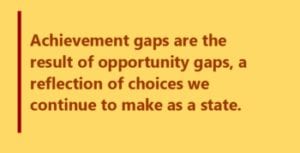Ryan J. Smith, Executive Director of The Education Trust–West, and Vice President of The Education Trust, issued the following statement:
Some progress on NAEP, yet persistent gaps are a call to action for California
“California students’ performance on the National Assessment of Educational Progress (NAEP) offers some encouraging signs of progress but reinforce that we still have a lot of work to do.
By a number of measures, the state improved its standing nationally. The state’s overall rankings in 3 out of 4 categories improved.
California is the second most improved state in 4th grade reading, as compared with 2015 results. It made especially strong gains in 4th grade reading among Latino students and English learners and in 8th grade reading among English learners. However, in 8th grade White students and more affluent students made the greatest gains, indicating that our state has the ability to help accelerate achievement for all students.
Unfortunately in math, the state did not fare as well. Overall results were flat in 4th grade and slightly up in 8th grade. Many persistent gaps remain and some have even widened. We see a backwards slide for Black students in both 4th and 8th grade math. Also gaps for Black, Latino, and low-income students in math widened at the 8th grade level, a crucial gatekeeping year for college preparatory courses in high school. The widening gaps for Black, Latino, and low-income students serve as a reminder that we are not yet doing enough to provide supports for them to succeed.
Achievement gaps are the result of opportunity gaps, a reflection of choices we continue to make as a state. California students who have been historically underserved continue to be given less – they are denied equal access to college preparatory courses, to rigorous STEM courses, and to the support staff that play such a vital role in supporting student success. Instead, we subject these students to archaic discipline policies that push them out of school. The onus isn’t on our students, but on us to dismantle this inequitable system – a system designed over decades to get the results it achieves.
California’s prosperity hinges on how well we educate our students. This year we will hear from individuals vying to become Governor and State Superintendent of Instruction. We must remind them that California’s future depends on the 6 million students currently in our schools and the millions more that will attend our schools over the next few decades. These are the students who will become the marine biologists working along our coasts, the engineers perfecting high speed rail, and the community leaders holding our state accountable for years to come. Now is not a time for complacency but for a greater sense of urgency.”




